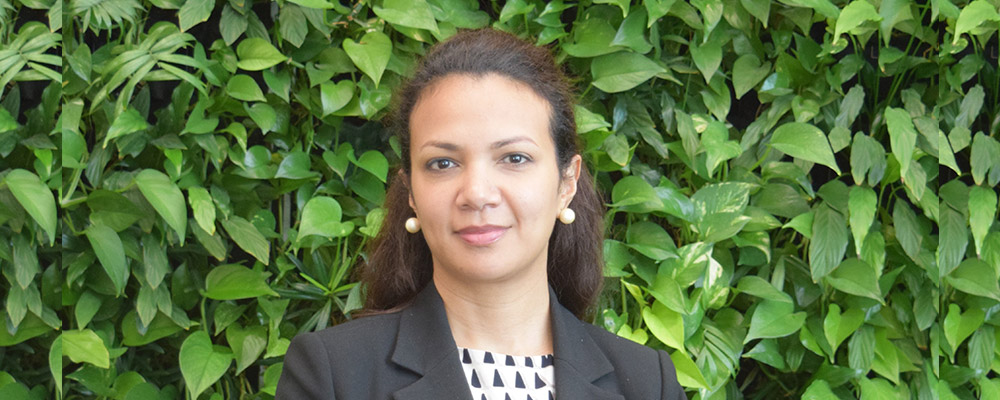Head of Human Resources, Global Green Growth Institute
1. Tell us more about the Global Green Growth Institute (GGGI), and what is meant by ‘green growth’?
The Global Green Growth Institute (GGGI) is a treaty-based international, inter-governmental organization established in 2012 at the Rio+20 United Nations Conference on Sustainable Development Summit. This landmark conference focused on two themes: a green economy in the context of sustainable development and poverty eradication; and the institutional framework for sustainable development. Green growth – or environmentally sustainable economic growth – is a pre-requisite for building a green economy in the context of sustainable development and poverty reduction in the face of worsening resource constraints and climate crisis. GGGI was founded to support and promote the mainstreaming of green growth, working with member countries and partners across four priority areas – energy, water, landscapes and green cities – considered to be essential to transforming national economies.
2. What implications will the transition to a green economy have on employment?
A successful transition towards a green economy can create new opportunities for workers, if the associated challenges are managed well. Green policies will reshape labour markets in ways that create new opportunities for workers, but it will also present a number of new risks. Different environmental policies and instruments may have very different implications for changes in the level and composition of labour demand, and for specific jobs. The effects are therefore likely to be heterogeneous across sectors, regions, and categories of workers. Secondly, ‘Smart’ automation is throwing up projection of significant structural job losses. Recent studies suggest around 30 per cent of UK jobs, 35 per cent of German jobs, and 38 per cent of US jobs will be lost by the early 2030s. Policies therefore need to address concerns about employment losses from the transition to green growth and highlight ways in which green policies can stimulate employment levels for a “just transition of the workforce”, as committed in the 2015 Paris Agreement. Finally, the promotion of green jobs in women-led smallholder agriculture and waste management could lead to greater gender equality. Therefore, the green transition should also be inclusive of women, particularly of poor women living in rural areas who are more dependent on natural resources and have less access to land, credit, agricultural inputs, and technology.
3. Is the future of work green?
It is clear that the 21st century of work needs more green jobs, to respond to a number of challenges, including rising unemployment, public health issues, decline in social welfare, population growth, skills gap, and sustainable lifestyle. Green jobs programme and greenpreneur projects led by GGGI and others demonstrate that there are many opportunities to create decent work with a reduced impact on the environment everywhere. In fact, the green economy has already created new jobs opportunities. In 2017, according to the International Renewable Energy Agency’s (IRENA) Renewable Energy and Job Annual Review 2018, 10.3 million people around the world, 5.3% more than the previous year, had green jobs. The ILO estimates that the green transition could generate 24 million new jobs globally by 2030, which would offset some of the job losses from automation. Innovation and resource efficiency gains are one of the most promising areas of future green jobs. The new jobs will be created by adopting sustainable practices in the energy sector, using electric vehicles, and increasing energy efficiency in existing and future buildings. Some other opportunities are in the areas of renewable energies, sustainable construction, sustainable agriculture, and green entreprises – where existing enterprises focus on greening their processes and/or create enterprises which produce green goods and services.
4. Skills shortages for green jobs, why does it exist and how can it be tackled?
Green jobs creation in any sector requires new competencies and skills. Those skills needs can be anticipated by making adjustment to existing education and training systems and by creating new training opportunities. These can be an important stone for giving youth, women and other disadvantaged groups access to the job and income-generation opportunities that will be created in a green economy. Governments, businesses and non-profit organisations can and should do much to help: easing the routes to training and re-training, encouraging and incentivizing adaptability and the critical and increasingly valued skills of leadership, creativity, life-long learning, and innovation. If ever there a time to increase investment in education, it is now. It should equip young people with the skills they need for the green jobs of the future.
5. How does GGGI support in-house green focused activities?
Since 2017, our organization has led efforts to greening the office and introduce green HRM policies. It resulted in greater efficiencies, lower costs and better employee engagement and retention. Our policies and programmes promote the use of people related technology advancements and initiatives such as telecommuting, virtual working, job-sharing, teleconferencing and virtual interviews, and online training. On the Talent Management front, we have just launched a new emerging leaders programme focused on sustainable leadership to create this next generation of sustainable development players. In this sense, HR professionals have an integral role to play to engage colleagues to ‘go green’ and ‘think sustainability’.
This disclaimer informs the readers that the views, thoughts, and opinions expressed in the text belong solely to the author, and not necessarily to the author’s organization.



